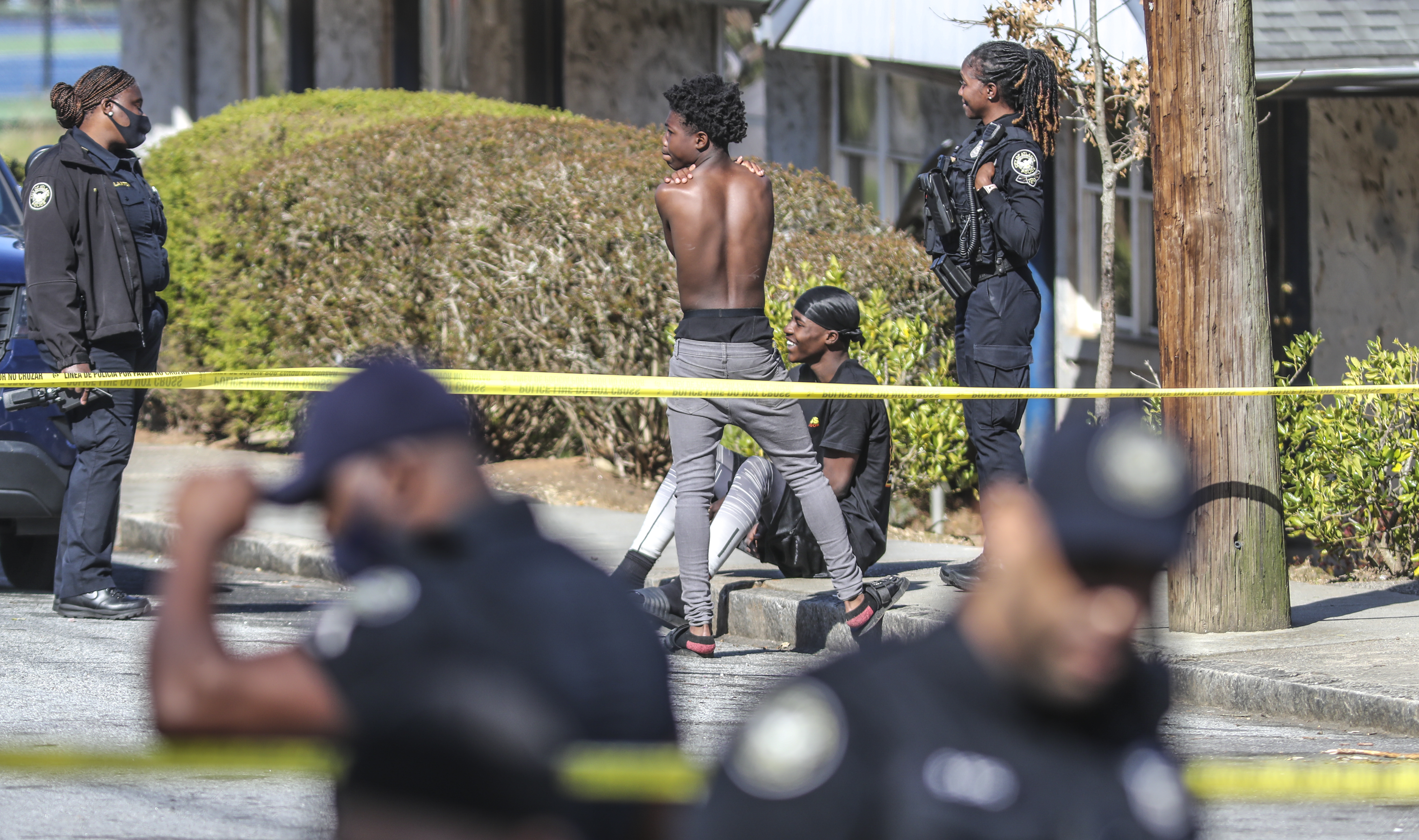
At violent apartment complexes, business model thrives on housing shortage, government inaction
Christopher Martin’s killing, in March 2020, and the anxiety it provoked underscore the persistent danger that confronts tens of thousands of residents at many apartment complexes across metro Atlanta, according to an investigation by The Atlanta Journal-Constitution.
A potent mix of lax security, deferred maintenance, governmental inertia and Georgia’s weak tenant-protection laws has rendered much of the region’s affordable housing barely habitable, the Journal-Constitution found in an examination of more than 1,000 apartment complexes in Fulton, DeKalb, Cobb, Gwinnett and Clayton counties.
At least three-fourths of the region’s most dangerous apartments, the Journal-Constitution determined, belong to private equity firms or other absentee investors under whom crime and squalor are not so much bad fortune as collateral damage from a widely followed business model.
These owners typically raise rents, perform merely cosmetic renovations and limit spending on security and maintenance. Many flip the properties in short order, nearly doubling their money in no more than two or three years. Often, the next owners repeat the cycle.
Along the way, profits accumulate, often bolstered by taxpayers. Government rental-assistance programs, tax credits and a disproportionate use of police, fire and other public services transform run-down complexes like The Life at Greenbriar into valuable assets for investors.
But government agencies provide minimal oversight of substandard complexes, hampered not only by laws that give them little authority and by inadequate resources but also, at times, by a lack of will to take on well-financed landlords. This regulatory environment enables many complexes to remain perilous quarters for tenants.
“What we give people is deadly,” said Esther Graff-Radford, an Atlanta lawyer who represents tenants in disputes with landlords. “What we give people breaks bodies and breaks minds. Landlords get rich by breaking people in our community with the housing conditions that you and I are paying for.”
In its yearlong investigation, the Journal-Constitution reviewed crime and code-inspection reports, real-estate documents, lawsuits, financing statements, promotional materials for investors and other public records. The newspaper also interviewed dozens of current and former residents of substandard apartments, as well as housing experts, activists, lawyers and landlords.
This examination identified more than 250 chronically dangerous complexes beset by violent crime and, often, by horrific living conditions: rats and garbage, leaking pipes and unmitigated mold that sicken many residents, especially children.

Credit: JOHN SPINK / AJC
Atlanta police talk to two young men in the wake of the shooting of a 15-year-old boy at Oakland City West End Apartments in March. Police say that the crime that has become astonishingly routine in many complexes often is committed by people who do not live at the properties. (John Spink / [email protected])
Credit: JOHN SPINK / AJC
Credit: JOHN SPINK / AJC
More than 13,000 school-age children live in 144 of the complexes in Atlanta and Cobb and DeKalb counties alone, according to student directory data provided by their school districts. School systems in Fulton, Gwinnett and Clayton counties and in Marietta refused to release the directory information.
The complexes are overwhelmingly occupied by people of color; 97% of the properties identified by the Journal-Constitution as the most dangerous lie in census tracts with a majority non-white population, according to the newspaper’s analysis.
Frequently, the shootings, robberies and other crimes that have become astonishingly routine in many complexes are committed by people who do not live at the properties, the police say. Tenants who cannot afford safer homes find themselves trapped amid the pervasive violence, sometimes as victims, other times as reluctant witnesses.
Of the more than 250 complexes, 162 accounted for one in every five homicides in metro Atlanta in recent years, the Journal-Constitution determined. At Forest Cove, a notoriously dangerous and dilapidated — and recently condemned — complex in southeast Atlanta that is scheduled for demolition, the police have investigated 19 homicides since 2009. At East Ponce Village, a Stone Mountain complex burdened by crime since it opened 35 years ago, 11 killings have occurred over the past decade.
And at The Life at Greenbriar, a ragged collection of 376 apartments on a violence-plagued stretch of Campbellton Road in southwest Atlanta, Christopher Martin was one of eight people killed in the past dozen years.
Day after day, complexes such as these place outsize burdens on police and other public safety resources. Of the 10 addresses in Atlanta that generated the greatest number of complaints about housing-code violations in the past five years, nine are apartment complexes. The police answered more than 28,000 calls at those complexes between 2017 and mid-2021 — roughly 15 a day.
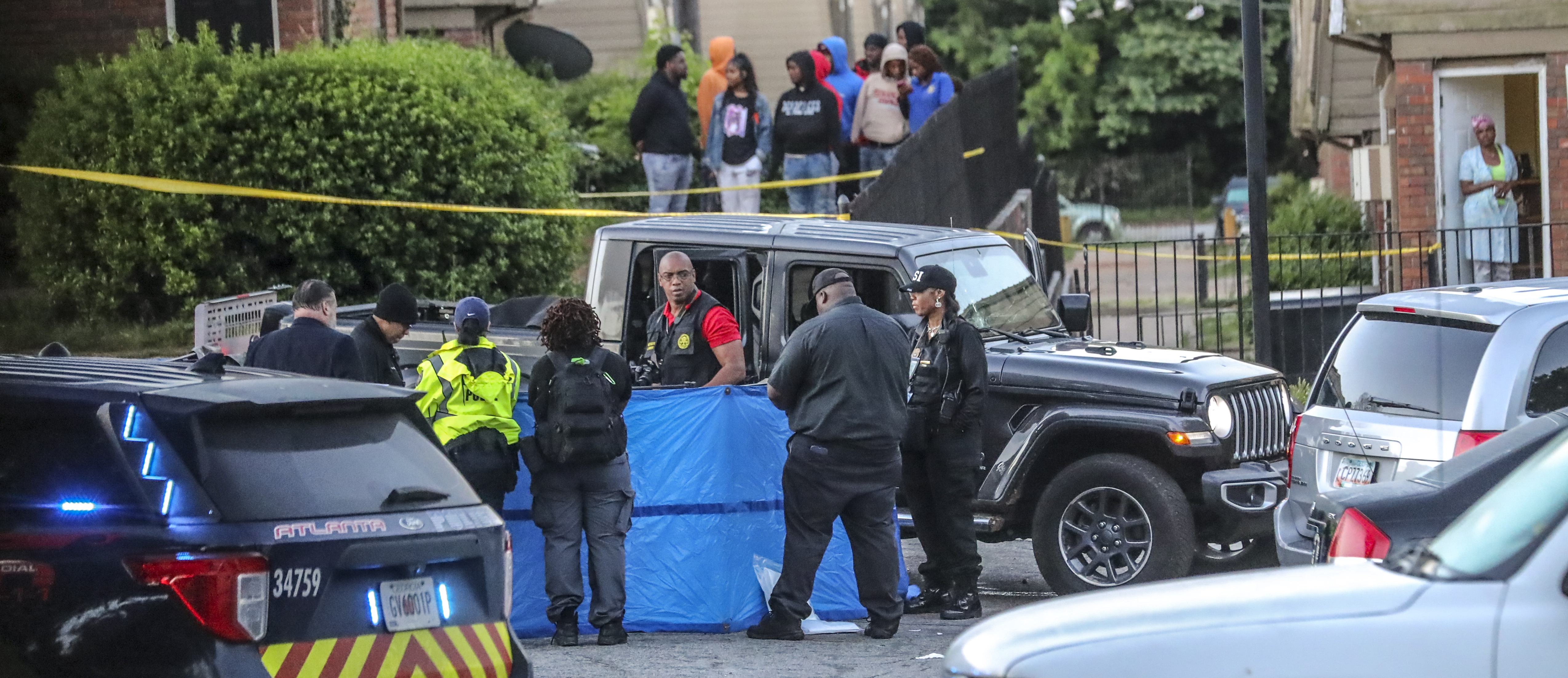
Credit: JOHN SPINK / AJC
Atlanta police investigate after the body of a shooting victim was found in May at Forest Cove Apartments. Another person was wounded in the shooting. Since 2009, 19 homicides have occurred at Forest Cove, and a judge has ordered that the complex be demolished. (John Spink / [email protected])
Credit: JOHN SPINK / AJC
Credit: JOHN SPINK / AJC
More than 4,100 calls came from The Life at Greenbriar. One-third involved shootings, armed robberies, fights and other outbreaks of violence, including 20 rapes and 167 reports of shots fired.
Crime in complexes like The Life at Greenbriar often is a byproduct of disregard for a property’s physical condition, according to criminologists and law enforcement officials.
“If you have a complex that’s in disarray and disrepair, it just kind of welcomes the criminal element there,” said Deputy Chief Carven Tyus of the Atlanta police, a former zone commander in the city’s southwest quadrant. “Because they think that that property is in neglect and no one’s paying any attention.”
Until recently, The Life at Greenbriar belonged to Olive Tree Holdings, a private equity firm based in New York. Crime flourished at the complex as Olive Tree and its affiliated management firm, The Life Properties, put off routine maintenance, ignored infestations of rodents and other pests, and allowed trash and debris to accumulate, according to public records and interviews with current and former residents.
In a statement, Olive Tree said that during the 15 months it owned the complex, it spent $4.3 million on renovations, landscaping, a new playground and security equipment that included lighting, surveillance cameras and gates.
“We take seriously the security of our properties so that we can provide the safest possible living environment for our residents,” the firm said.
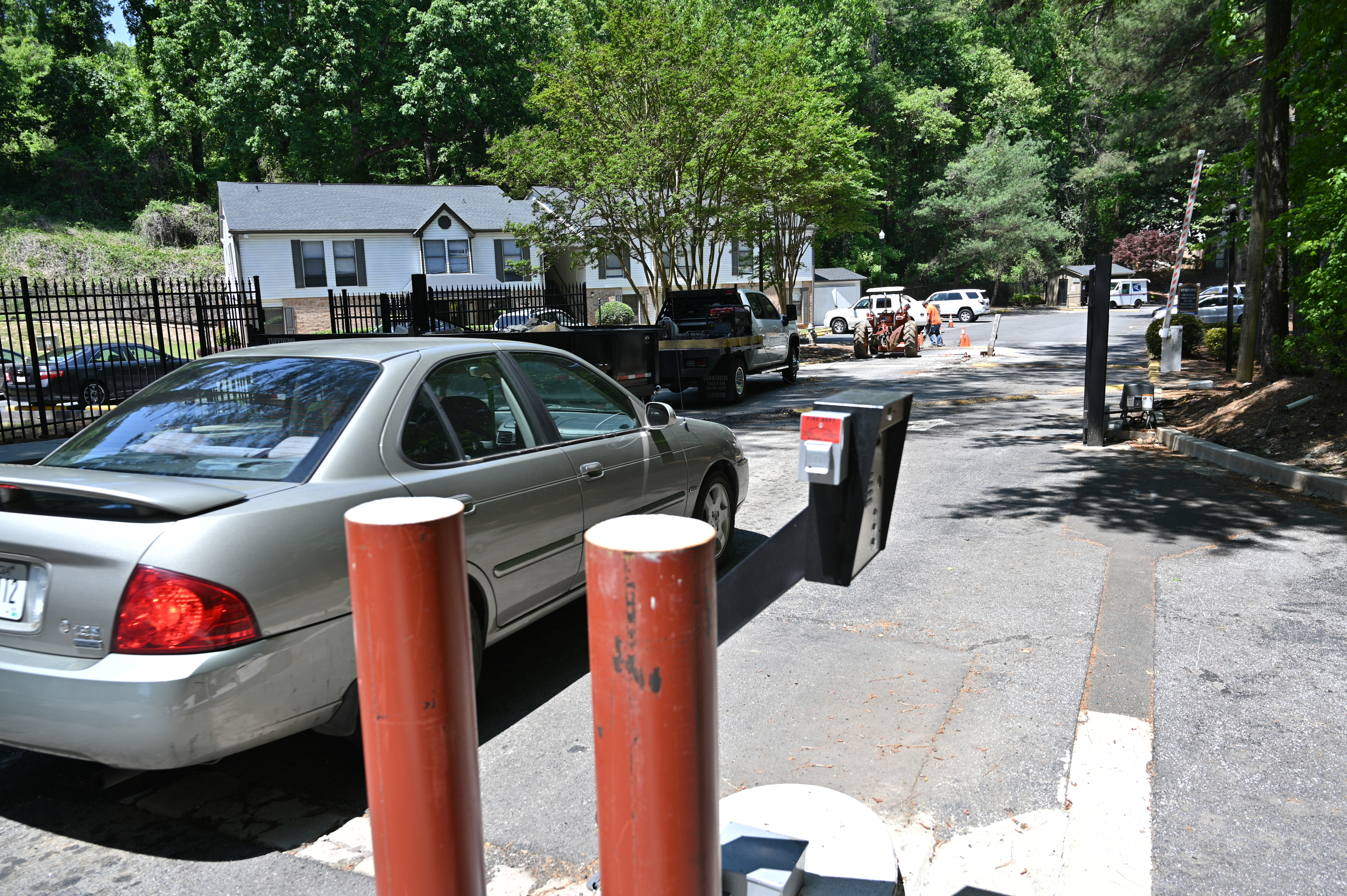
Credit: HYOSUB SHIN / AJC
In a statement, Olive Tree Holdings said that during the 15 months it owned The Life at Greenbriar, it spent $4.3 million on renovations, landscaping, a new playground and security equipment that included lighting, surveillance cameras and gates. However, the property’s gates never closed, enabling easy access to outsiders. (Hyosub Shin / [email protected])
Credit: HYOSUB SHIN / AJC
Credit: HYOSUB SHIN / AJC
However, under Olive Tree’s ownership, the property’s gates did not close, enabling easy access to outsiders like the woman accused of killing Martin. The playground has frequently been rocked by gunfire, according to residents and police reports; the chains on its swing set have been lopped off; and a climbing wall and slide have been tagged with gang symbols. The cameras didn’t function at critical moments. Private security patrols were either ineffective or nonexistent, residents said.
Questions arose about safety at the complex when a mortgage on the property was bundled into a securities offering in 2020. In an analysis for potential investors, the business data firm Dun & Bradstreet said that because of prevalent crime, “the property’s transformation seems to be an uphill battle.”
But Olive Tree had engaged two retired Atlanta police officials to train security officers and to set up neighborhood watch programs, Dun & Bradstreet’s report said. The report also noted the installation of the security cameras, “which management deemed good.”
About two months after that analysis was published, an Atlanta police detective asked to review surveillance footage from the night Martin died. The video might have shown not only the shooter but how she got away.
A property manager at The Life at Greenbriar responded with bad news.
“We are currently in the process of finalizing installation for our cameras here on the property,” she wrote in an email to the detective. “They are currently not recording.”
She concluded with a tag line from a corporate marketing campaign:
“Live Life Right!”
‘This is not normal’
Gunfire is so commonplace at The Life at Greenbriar that when police officers investigated one shooting in 2017, they discovered spent shell casings left behind after another.
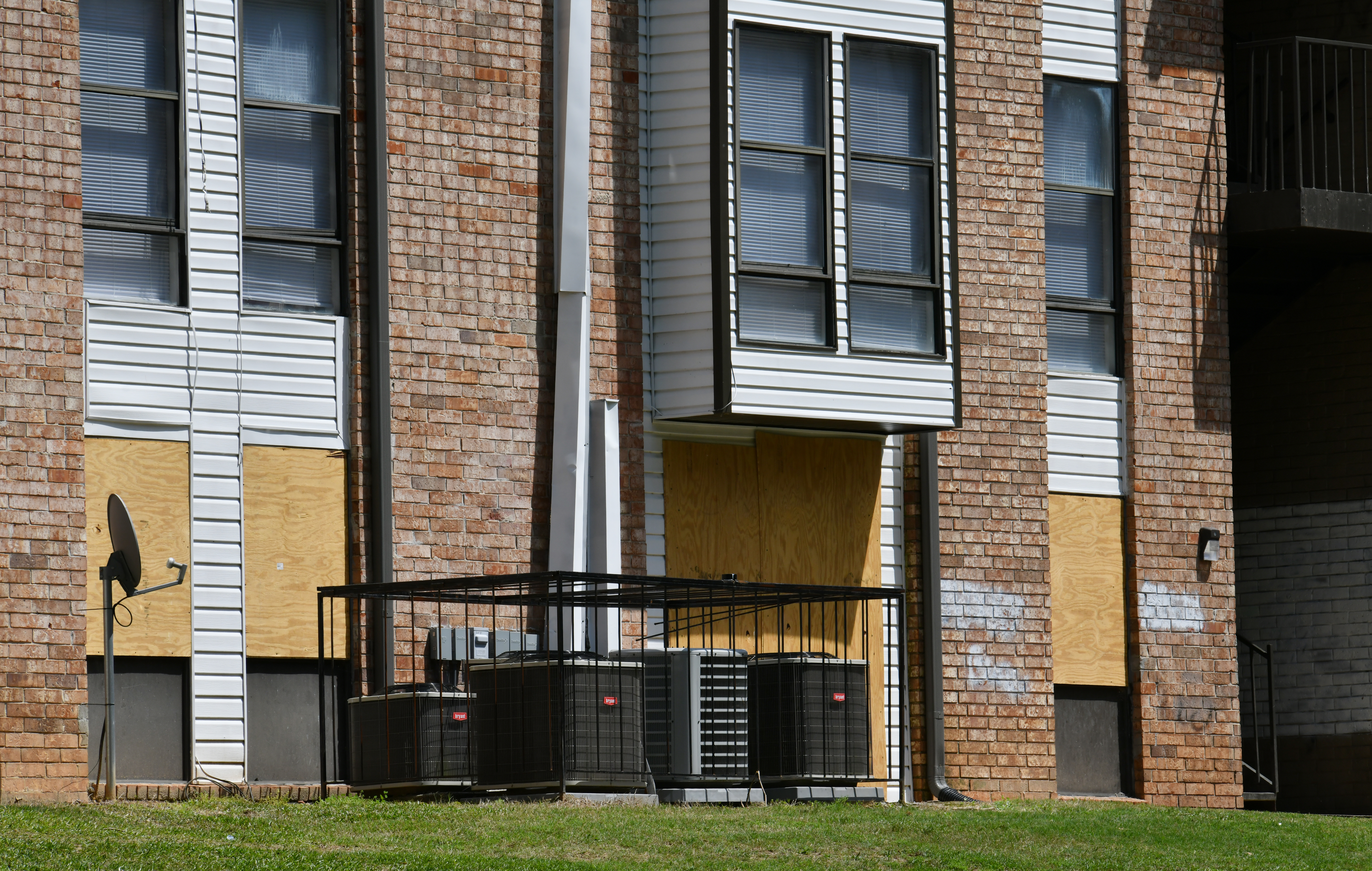
Credit: HYOSUB SHIN / AJC
Gunfire is so commonplace at The Life at Greenbriar, now renamed The Hills @ Greenbriar, that when police investigated a shooting in 2017, they discovered spent shell casings left behind from an earlier one. Squatters, drug dealers and random gunfire have become a routine part of daily life for many residents. (Hyosub Shin / [email protected])
Credit: HYOSUB SHIN / AJC
Credit: HYOSUB SHIN / AJC
Shots can be heard “daytime and nighttime,” said Zandra Steepson, 30, who lived at The Life at Greenbriar from June 2020 to December 2021. A bullet once broke a window in her apartment, Steepson said, and many mornings she found shell casings outside her building. Some days a neighbor might ask, “Did you know the person who got killed last night?”
A week before Christmas last year, Cardarrius Mims was up late when he heard what sounded like an argument in a vacant apartment upstairs. It ended abruptly with the sound of gunfire.
“When I heard the gunshot, I got on the ground,” Mims, 28, said later.
One bullet ripped into an upstairs wall and burst a neighboring apartment’s water pipe, according to a police report. Mims, still on the floor, heard water gushing into his apartment faster than he could mop it up. The flow didn’t stop until firefighters arrived to turn off the water for the entire building.
In the vacant apartment, police officers found more than 1 pound of marijuana and several rounds of live ammunition. “It appeared that shots may have been fired inside the apartment as well as outside,” an officer wrote in the incident report.
Mims had seen people coming and going, apparently buying and selling drugs in that apartment, he said. The same was true for the vacant unit next door to his, where the door stayed unlocked and, often, wide open.
“People just come off the street and live in there,” he said.
He told apartment managers about the squatters, but “that hasn’t been a concern to them,” he said. The apartment next door is still vacant and still open.
“This,” Mims said, “is not normal.”
But squatters, drug dealers and random gunfire have become routine for many residents.
One day this past winter, Darius Williams walked out of his apartment to his prized BMW. Williams, 24, had saved $6,000 to buy the car, his first. He rebuilt the engine himself.
In the parking lot, Williams discovered that someone had riddled his car with bullets overnight. One lodged in the ignition, so he couldn’t start the engine, much less drive the car.
Williams had just accepted a new job but now had to find other ways to and from work. Then, after a few days, the apartment complex had his car towed because it appeared to have been abandoned.
“It’s a lot, staying here,” Williams said. “They don’t have no control over this neighborhood.”
One week, two killings
Late one afternoon in March 2020, a burgundy-colored Cadillac drove through the open security gate at The Life at Greenbriar and parked outside Building 13. The driver waited as Shirley Ann Fuller knocked on Christopher Martin’s door to buy marijuana.
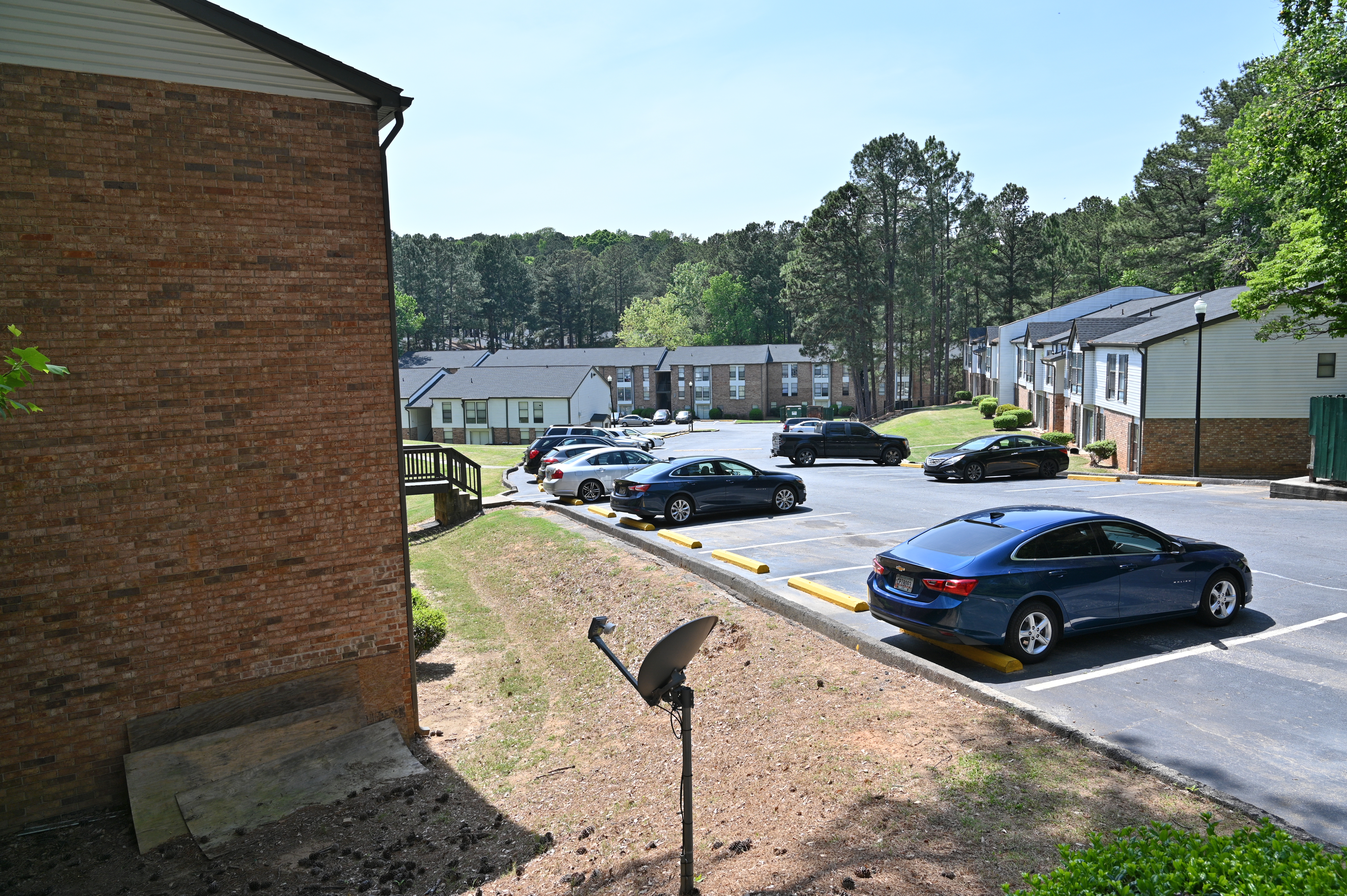
Credit: HYOSUB SHIN / AJC
The Life at Greenbriar, now renamed The Hills @ Greenbriar, is a ragged collection of 376 apartments on a violence-plagued stretch of Campbellton Road in southwest Atlanta. One resident, whose car was riddled with bullets, then towed with no warning, says, “It’s a lot, staying here. They don’t have no control over this neighborhood.” (Hyosub Shin / [email protected])
Credit: HYOSUB SHIN / AJC
Credit: HYOSUB SHIN / AJC
Martin, 45, had a history of dealing drugs, going back almost two decades. He served two years of a 10-year prison sentence after he admitted selling 28 grams of cocaine to an undercover police officer in Cobb County in 2004. At The Life at Greenbriar, according to police reports, he sold drugs out of a second-floor apartment in Building 13.
A resident of another building told the police that after he heard a gunshot, he saw the burgundy Cadillac speed away. Officers found the car, and Fuller, at her friend’s house, about 9 miles away.
At first, Fuller said only that she bought marijuana from Martin, according to police reports. She didn’t know that, unlike the complex’s surveillance system, a doorbell camera at Martin’s apartment had captured video of their encounter. Under interrogation by detectives, she said she shot Martin in self-defense after he slapped her.
Fuller, 45, is awaiting trial on murder charges. The Cadillac’s driver, 66-year-old Marvin Chaney, faces weapons charges related to the .40-caliber handgun used in the shooting.
Martin’s killing happened on a Sunday, at the beginning of a remarkably violent week at The Life at Greenbriar. By week’s end, the police had answered 44 calls at the complex, including 14 that involved gunfire or threats of shooting.
One resident reported that someone fired a shot through his apartment window as he sat inside with his girlfriend. A woman with a gun threatened to shoot herself or passersby in the parking lot.
Eight times, residents called the police after hearing gunshots outside their buildings.
“These people are out here shooting,” one man told a 911 operator at 1:44 a.m. that Monday. “They’ve been fighting out here all night in my neighborhood. This is the second time somebody started shooting.”
Later in the week, another caller was incredulous when the operator asked whether she could see who was shooting outside her building at 5:30 in the afternoon.
“I’m in my apartment,” the woman said. “It’s been three shootings over here, and two people have actually gotten killed. I’m just laying in my living room. I haven’t moved over here. I been over here too long.”
That second homicide had occurred two days after Martin’s killing. Carmen Ware told the police that her former boyfriend came to her apartment and provoked an argument with her and her roommate, Felicia Morgan.
When the former boyfriend, Darrian Dupree, pulled a gun, Ware said, she retreated into the bedroom, but Morgan followed Dupree toward the front door. Ware heard Morgan dare him — “Shoot me, …” — and then a gunshot.
Ware found Morgan in the apartment’s foyer with a gunshot wound to her upper right chest.
“She’s bleeding really bad,” Ware told a 911 operator. “There’s so much blood.”
Morgan, 34, died at Grady Memorial Hospital. Dupree, 31, who had twice served prison sentences for drug and weapons offenses, was charged with murder. He pleaded not guilty.
Disrepair
For much of the past century, the Atlanta way of dealing with dangerous and derelict housing was to tear it down.
The nation’s first public housing project was Techwood Homes near downtown, built to replace a massive shantytown just off the Georgia Tech campus. President Franklin D. Roosevelt dedicated the project — constructed only for white residents — in 1935.
“People who could never before get a decent roof over their heads will live here in reasonable comfort and healthful, worthwhile surroundings,” Roosevelt said in a speech at Grant Field, Tech’s football stadium.
Over the decades, as racially discriminatory housing policies helped white residents leave for their own homes and Black tenants became the majority at Techwood, authorities let the project deteriorate. Techwood became a symbol of urban blight, a conspicuous display of crime and poverty in a city trying to showcase its social and economic progress. City officials decided to demolish the complex ahead of the 1996 Atlanta Olympics, and by 2011 the rest of Atlanta’s multifamily public housing projects also had been razed. The first city to embrace public housing became the first to dismantle it.
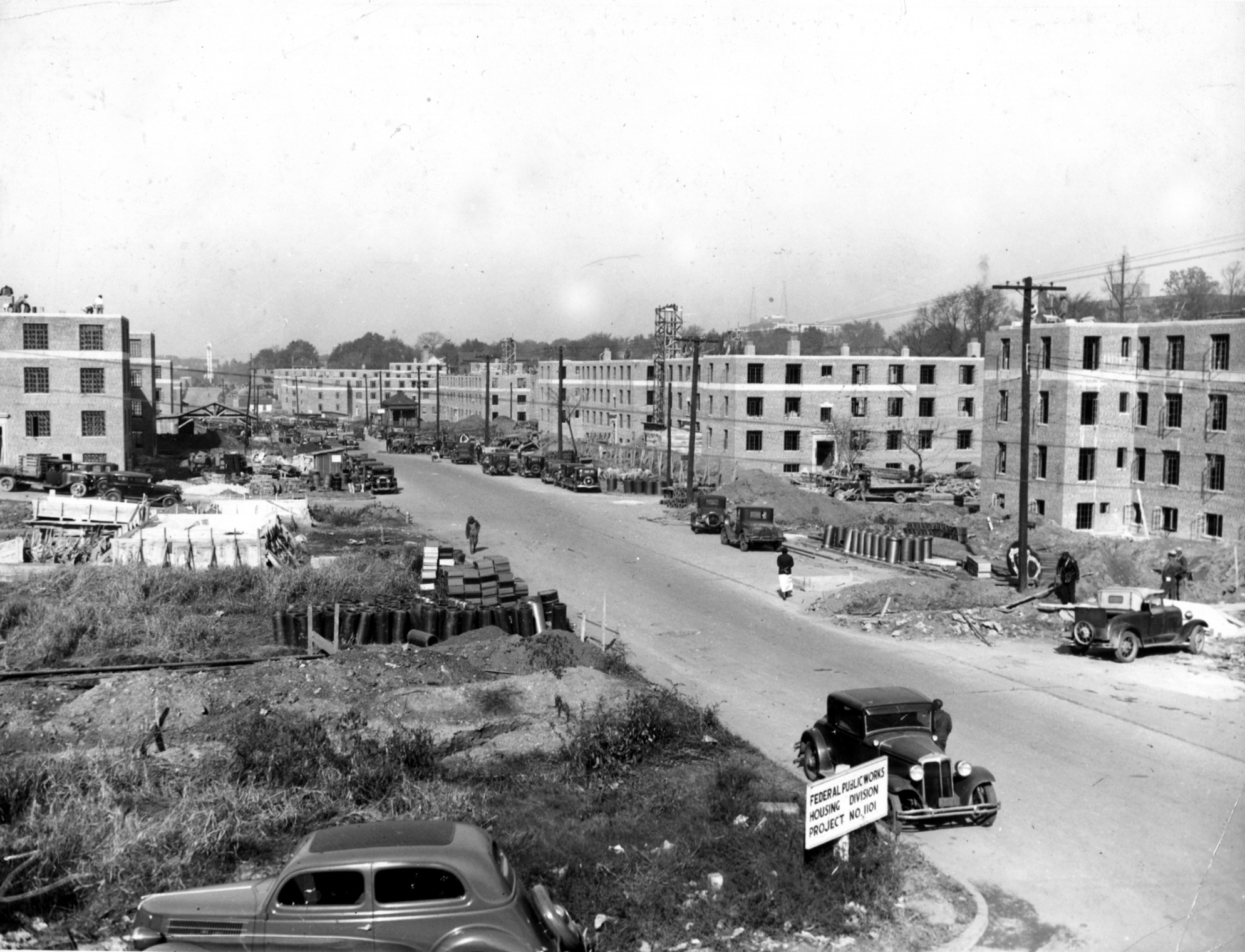
Credit: AP
The nation’s first public housing project was Techwood Homes near downtown, built to replace a massive shantytown just off the Georgia Tech campus. President Franklin D. Roosevelt dedicated the project — constructed only for white residents — in 1935. (AJC file)
Credit: AP
Credit: AP
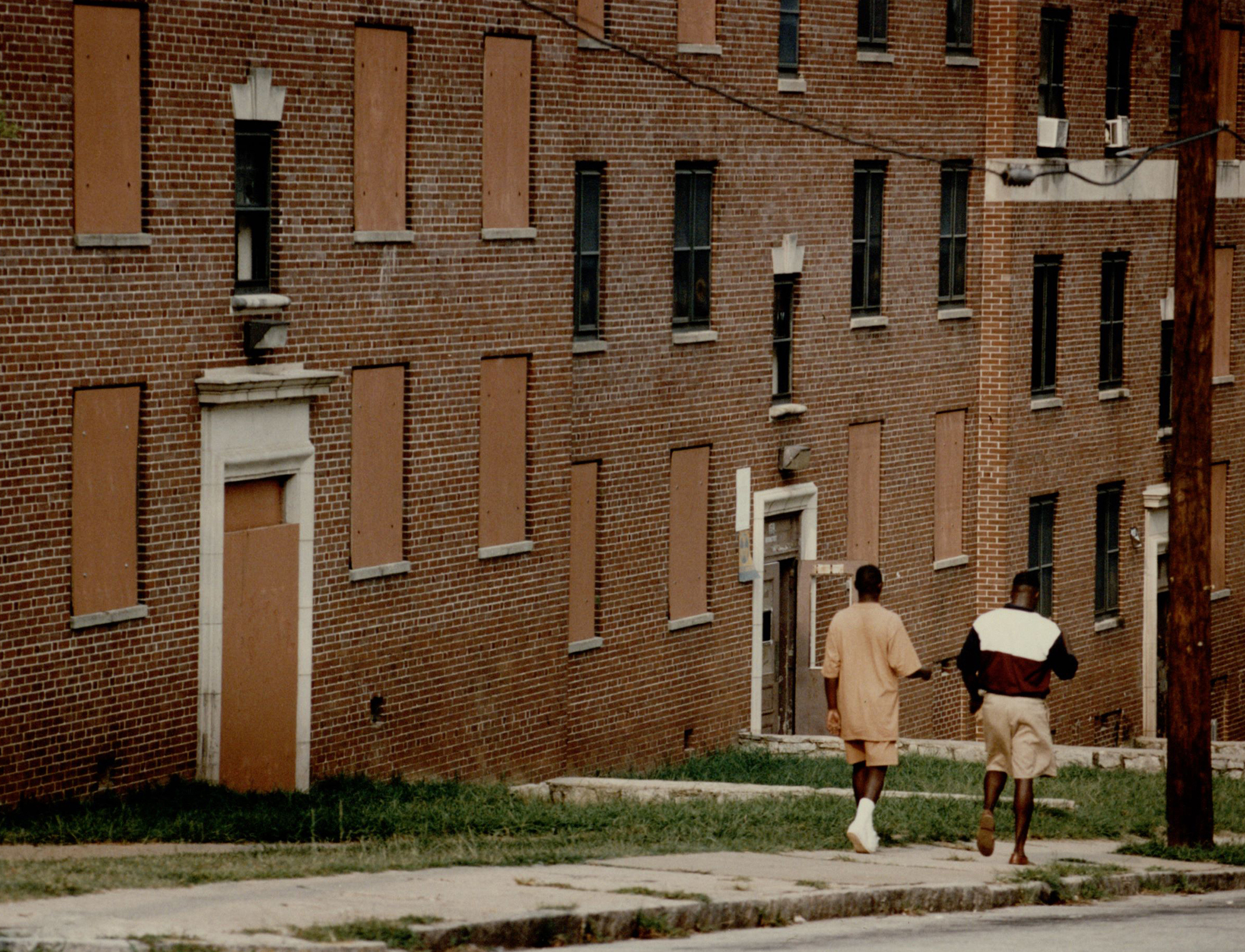
Credit: FRANK NIEMEIR / AJC
Techwood Homes, seen boarded up in 1993, was torn down before the 1996 Olympics. Techwood had become a symbol of urban blight, a conspicuous display of crime and poverty in a city trying to showcase its social and economic progress. By 2011 the rest of Atlanta’s multifamily public housing projects also had been razed. The first city to embrace public housing became the first to dismantle it. (AJC 1993)
Credit: FRANK NIEMEIR / AJC
Credit: FRANK NIEMEIR / AJC
As a result, many people who might have lived in a publicly owned apartment in past generations now end up in a complex like The Life at Greenbriar.
Affordable housing is critically scarce in metro Atlanta. In a recent report, the National Low Income Housing Coalition, a nonprofit advocacy and research organization, said affordable rental homes are available to only 43,000 of the area’s 163,000 households classified as having extremely low incomes. That 120,000-unit deficit may be insurmountable; even an aggressive plan like Atlanta Mayor Andre Dickens’ proposal to build or preserve 20,000 affordable homes over the next eight years would barely narrow the gap. With such a strong demand for inexpensive housing, owners of aging properties have little incentive to lift them out of their states of disrepair.
Discussions of the affordable housing crisis may sometimes seem arcane, and what people think of as “affordable” is rapidly changing amid dramatic rent increases. But reports by the National Low Income Housing Coalition, a nonprofit research and advocacy organization, put the issue into perspective.
In metro Atlanta:
· An annual income of $47,000 was needed in 2021 to afford a two-bedroom rental home with the fair market price of $1,185 a month.
· An unskilled worker would have to perform more than three full-time jobs at minimum wage to afford a market-rate two-bedroom apartment.
· Those earning 30% or less of the median income — $22,000 a year — can afford rent of no more than $566 a month.
· About 120,000 additional affordable housing units are needed for households classified as having very low incomes.
The Life at Greenbriar — previously known as the Pines at Greenbriar and, before that, Deerfield Gardens — was built in 1971 and was well past its prime when Olive Tree bought it in 2019.
Since 2017, Atlanta’s code-enforcement agency has received nearly 100 complaints about significant health or safety threats at the complex. Only eight other addresses in the city generated more reports during that period. Twenty-eight of those complaints were lodged during the time Olive Tree owned the property.
One resident complained about a tree branch growing through the air conditioning vent in her bathroom ceiling. Others reported rats and cockroaches, no heat and no hot water, exposed electrical wiring and broken kitchen appliances, leaky ceilings and moldy carpet, overflowing dumpsters and sewage spills.
“I have human FECES in my toilet going on 4 months,” resident Marcia Olive wrote in 2021. “I requested services. To this day … it’s still not fixed.”
In an interview, Olive said she repeatedly asked apartment managers to repair the plumbing. She and her son had to go to friends’ apartments just to use the bathroom.
“Forgive my language,” Olive, 53, said, “but I was really pissed.”
Finally, she told apartment managers she would no longer pay her $1,052 monthly rent until the repairs were completed.
Rather than fix the plumbing, the complex filed court papers to evict Olive. After telling a judge about her ordeal, she agreed to pay $1,900 — about half of her back rent — to remain in the apartment. Six months after she first complained, the toilet finally was repaired.
Still, she said, “I got to pay for feces in my toilet? The months I stayed there with that, that should have been free.”
Like Olive, Nehemiah Yisrael struggled to get repairs to his apartment completed. When the lock on the front door broke, the complex wouldn’t fix it, Yisrael said, so he bought security cameras, straining a household budget already so tight that he planned his spending weeks and sometimes months in advance. When the air conditioning went out, he had to wait weeks for a repair. His infant daughter had contracted COVID-19 and meningitis and needed cool, clean air during her recovery, and Yisrael bought as many electric fans as he could afford to keep at least part of the apartment cool.
“What we give people is deadly. … Landlords get rich by breaking people in our community with the housing conditions that you and I are paying for.”
– Esther Graff-Radford, an Atlanta lawyer who represents tenants in disputes with landlords
For Yisrael, 32, who works as a commercial cleaner, nothing at The Life at Greenbriar seemed easy. He couldn’t let his two older children play outside the apartment because he often heard gunshots coming from the playground next to their building, he said, and he sometimes saw used condoms discarded on the ground. And he sensed that the more he complained about the living conditions, the more the complex’s management held it against him.
Maintenance workers came to fix warped flooring, he said, but they merely tore out damaged pieces and left. They started repairing a leaky pipe but didn’t finish the job, leaving behind an “unbearable” smell, Yisrael told apartment managers in an email. He thought apartment managers were failing to record his rent payments. But once when he refused to leave the leasing office without a receipt, he said, managers summoned the police to escort him out.
“Right is right and wrong is wrong and legal is legal,” he wrote in one email to the leasing office, one of several he shared with the Journal-Constitution. “I just want to pay what’s right and take care of my family.”
Having signed papers to pay $899 a month in rent for his two-bedroom apartment, Yisrael said, he felt trapped and helpless.
“Once you sign that contract, you’re coerced,” he said. “Once they got you in, they got you in. It’s like a prison. A prison where they have you pay rent.”
‘It’s not my problem’
No single government agency has the authority to regulate apartment complexes. The police primarily react to crimes as they occur, although Tyus, the deputy Atlanta chief, said his department sometimes increases patrols in a complex or assigns undercover officers to deter criminal activity.
“It’s just like anything else, though,” Tyus said. “It’s fluid in nature. We’ll lock up a couple, and a couple more will appear after those are locked up.”
Other agencies with oversight roles often seem reluctant to exercise their power.
Dozens of complexes in metro Atlanta continue collecting federal rent subsidies despite failing health and safety inspections. Federal authorities rarely if ever try to claw back low-income housing tax credits, often valued at millions of dollars, from complexes that don’t meet standards. Some local governments won’t even accept complaints about possible housing-code violations inside apartments.
Residents sometimes file lawsuits over living conditions. But Georgia’s tenant-protection laws, among the weakest in the nation, are heavily weighted in property owners’ favor.
“Once you sign that contract, you’re coerced. Once they got you in, they got you in. It’s like a prison. A prison where they have you pay rent.”
– Nehemiah Yisrael, former resident at The Life at Greenbriar
Landlords’ responsibilities are defined only in the broadest terms: They must “exercise ordinary care” to keep their properties safe.
Tenants, however, may not withhold rent to force repairs, no matter how dangerous or unsanitary a rental property might be. That tactic is allowed in 41 other states and the District of Columbia. In Georgia, not paying rent for any reason can lead to eviction, a legal process that carries severe consequences: not just the immediate threat of homelessness but lasting damage to a tenant’s credit history, making it even more difficult to find a new home for years to come.
Georgia lawmakers have shown little inclination to enhance tenant protections.
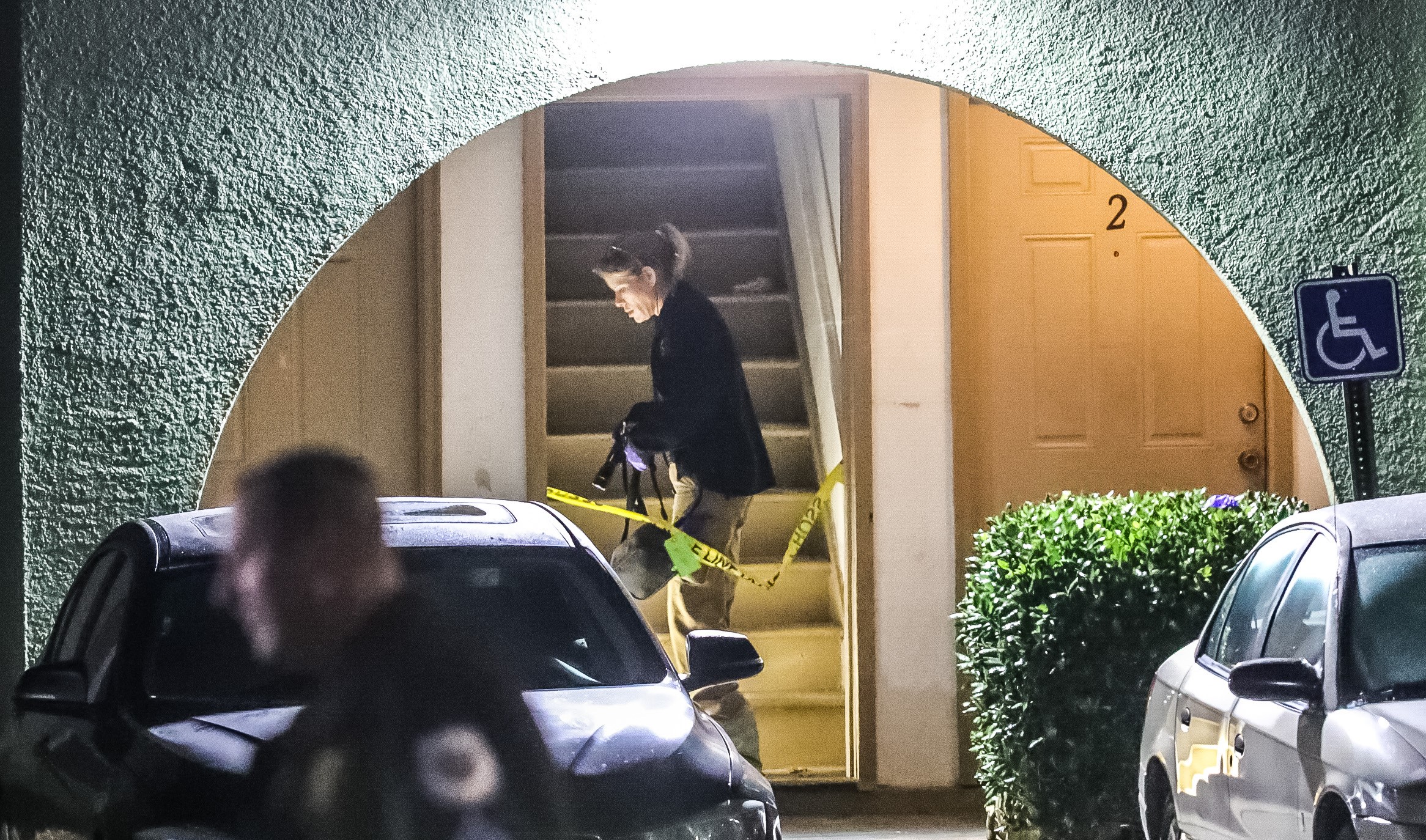
Credit: JOHN SPINK / AJC
Police in Cobb County investigate a homicide at the Mableton Ridge apartment complex in December 2021. Crime plagues apartment complexes throughout metro Atlanta. (John Spink / [email protected])
Credit: JOHN SPINK / AJC
Credit: JOHN SPINK / AJC
In 2021, Rep. Mesha Mainor, a first-term Democrat from Atlanta, introduced legislation that would require landlords to compile crime reports for their properties every six months and then to share the information with both current and potential tenants. Landlords who failed to disclose the crime information could be sued under the state’s fair-housing laws.
“I don’t care if your apartment is $3,000 a month or $500 a month,” Mainor said in an interview. “You should be able to know what crime is going on.”
But the House Judiciary Committee took Mainor’s proposal in a different direction. The Georgia Apartment Association, long a powerful lobby in the Capitol, had announced its opposition during a subcommittee meeting, citing “uneasiness” over whether information about crime — although a matter of public record — would be readily available to landlords.
The full committee rewrote the bill to require that law enforcement agencies post information on apartment crimes on their websites, but only if charges had been filed or arrests made. Apartment owners would not be required to do anything.
The House of Representatives passed the reworked bill in March 2021 by a vote of 128-34.
The Senate, however, never held a committee hearing on the bill, never debated it, never considered it at all. When the latest two-year legislative session ended in April, the bill died.
A spokeswoman for the apartment association declined a request for an interview. In a statement, the association said: “We are always actively working with legislators and partner organizations to address and find solutions for real or perceived issues related to multifamily housing and will continue to do so.”
Although they often blame problems on bad tenants and poor policing, landlords have more power than anyone else to make their properties safer, criminologists say. They could secure vacant units to keep out drug dealers and other squatters. They could make sure windows and doors lock properly. They could run criminal background checks on potential tenants and evict residents who sell illegal drugs or commit other crimes.
“That is the common thing: ‘It’s not my problem, it’s a police problem,’” said John Eck, a professor of criminal justice at the University of Cincinnati who studies policing and crime prevention. “It turns out all of these excuses don’t hold up. There are plenty of landlords who rent out to people in difficult circumstances and don’t have these problems.”
‘Investors first’
Owners of some of metro Atlanta’s most challenged apartment complexes make no secret of the fact that renting apartments to poor people can be extremely profitable.
“With Prosperity, you can count on strong performance,” boasts the website of Prosperity Capital Partners, the Florida-based owner of Royal Oaks in southwest Atlanta and 14 other complexes in Georgia. The website is headlined, “Putting investors first since 2003.”
Left unaddressed are the more than 400 serious crimes, including three homicides and seven rapes, reported at Royal Oaks over the past dozen years or the 185 housing-code violations cited after an inspection there in 2021.
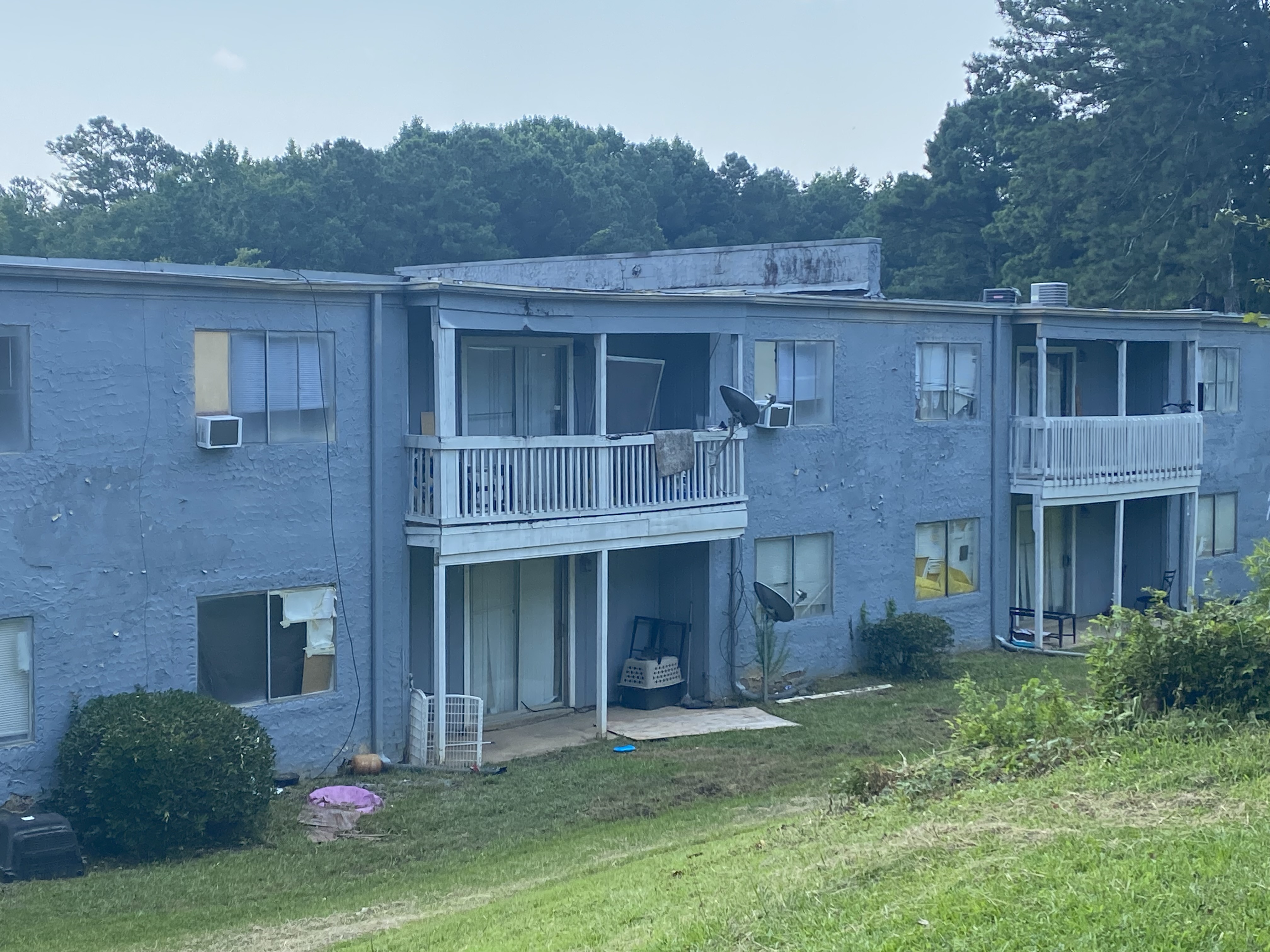
Credit: ADRIANNE MURCHISON / AJC
More than 400 serious crimes, including three homicides and seven rapes, have been reported over the past dozen years at Royal Oaks in southwest Atlanta. A 2021 inspection found 185 housing code violations. Yet even hazardous complexes are profitable to landlords, who typically raise rents, make cosmetic fixes, and limit spending on security and maintenance. (Adrianne Murchison / [email protected])
Credit: ADRIANNE MURCHISON / AJC
Credit: ADRIANNE MURCHISON / AJC
Prosperity instead emphasizes that its investors have earned double-digit returns each of the past 18 years. In a recent solicitation, the firm projected a 19% annual return on investments in Royal Oaks, along with “significant tax benefits” from depreciation.
“By increasing rents and decreasing vacancies, while also decreasing management expenses,” Prosperity’s website says, “net operating income improves, which increases overall values significantly.”
Randy Lawrence, Prosperity’s founder, described on the company’s website as “a transformational community leader and church founder,” did not respond to requests for comment. A management company working for Prosperity said last year that $3.2 million had been budgeted for repairs at Royal Oaks.
Across metro Atlanta, the Journal-Constitution found, values of apartment complexes that cater to people with limited incomes have risen dramatically in the past five years, through multiple changes in ownership, repeated rebrandings and, in many instances, an alarming number of violent crimes.
East Ponce Village, a sprawling complex of more than 900 units in Stone Mountain, for instance, has had five owners, four names and, in the past decade, hundreds of violent crimes in addition to its 11 homicides.
In just six weeks in 2021, police reports show, two rapes and one shooting occurred in vacant apartments. At least two of the units, according to the reports, were illicitly occupied by drug dealers and their customers.
The crime didn’t prevent the complex’s latest owner from paying a premium for the property.
The private equity firm Adams Investor Group, based in a suburb of Philadelphia, closed on the purchase the same week last year as the first rape. The previous owner had acquired the property four years earlier for $38 million, real estate records show. The Adams firm took over $47 million in debt and added $28 million in cash to complete the deal, significantly increasing the property’s value to $75 million.
The firm has bought and sold six other complexes in metro Atlanta since 2016. Its founder, Brian Adams, describes the region as “one of the most fertile grounds for apartment investing in the U.S.”
On the firm’s website, he tells investors that his “formula” — buying distressed properties, making “small but significant overhauls to interiors” and applying “TLC” to the grounds — has proved successful “time and again.”
“The equity shoots up,” he says, “rents rise to meet the market, and other investors come knocking on our door with generous offers.”
In an interview, Adams said his company had been “very proactive” at East Ponce Village by installing security cameras, repairing gates and clearing out abandoned apartments. All of that, he said, has reduced the property’s “chaos.”
“My goal is to provide a safe and secure environment for our residents,” he said.
However, he said: “If the resident doesn’t reciprocate, we can only do so much.”
Among Adams’ former holdings in Atlanta: The Life at Greenbriar. He bought that complex, then called the Pines at Greenbriar, in 2018 and sold it the following year to Olive Tree Holdings for $23.7 million, almost $8 million more than he had paid.
Fifteen months later, in January 2022, Olive Tree sold the complex for $43.5 million. It was one of eight metro Atlanta properties the firm sold last year in transactions that totaled $321.4 million — 74% more than it had paid for the complexes. It held none of the complexes longer than four years, according to real estate records.
The new owner is ICER Properties, another investment firm from New York. ICER recently bought eight apartment complexes in the Atlanta area as part of a strategy to disinvest in New York in favor of cities it considers friendlier to landlords.
“Just the environment of local government in New York, they make it impossible to make money,” Joseph Jemal, the president of ICER, told the online news site Bisnow last fall. “It’s just crazy regulations every day coming.”
In Atlanta, no regulations prevented ICER from raising rents at The Life at Greenbriar to as much as $2,000 a month for a three-bedroom apartment that previously rented for hundreds of dollars less.
ICER gave the complex a new name, The Hills @ Greenbriar, and a new marketing slogan, “The Intersection of Style & Convenience.”
The property’s website features photos of attractive young professionals drinking lattes and, in a section titled “Amenities,” attending a yoga class.
Another click, however, reveals the actual amenities: “on-site management,” basic kitchen appliances and “wood-style” flooring. No lattes. And no yoga classes.
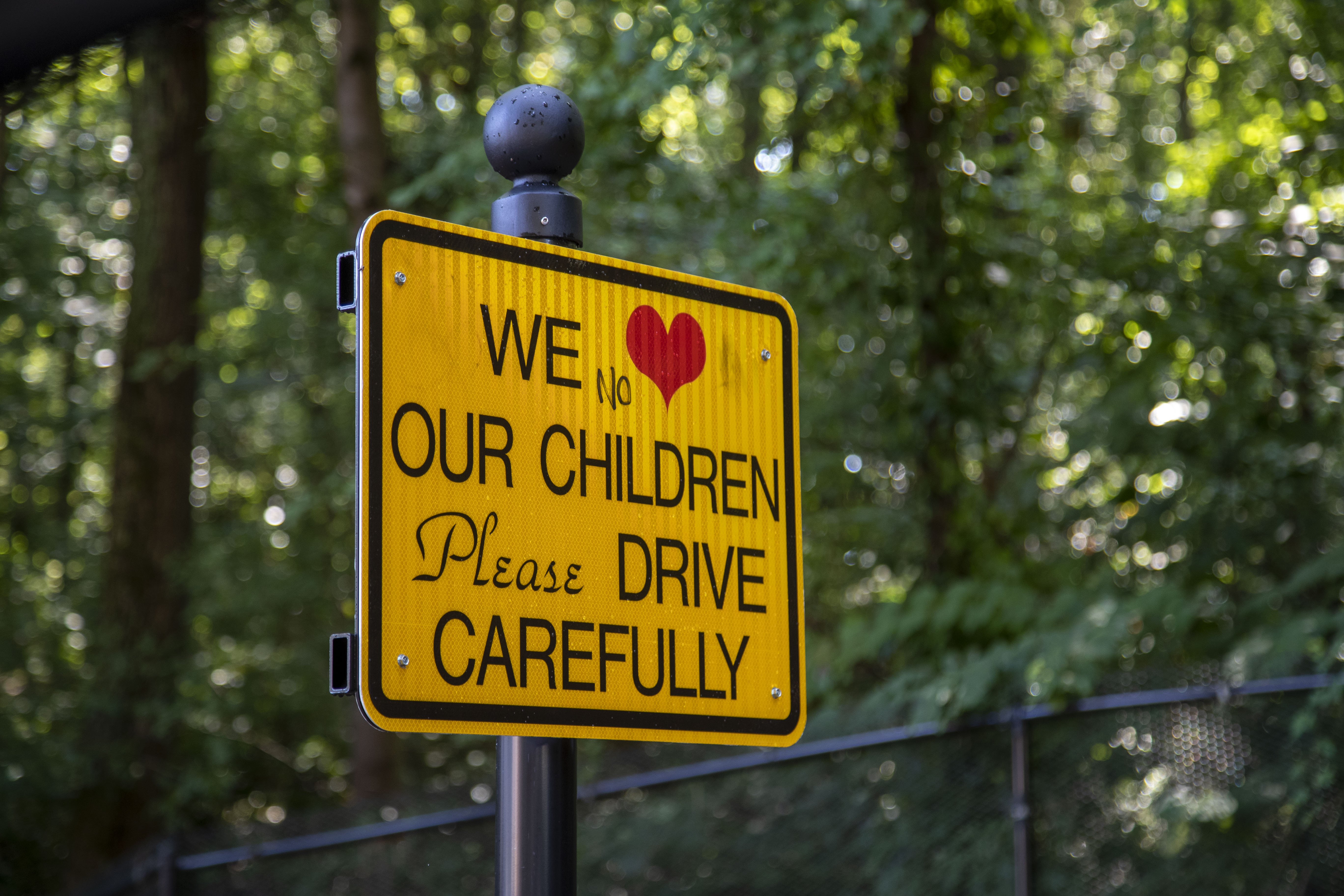
Credit: ALYSSA POINTER / AJC
According to the Atlanta Public Schools, 148 children listed The Life at Greenbriar complex, now known as The Hills @ Greenbriar, as their home address at the beginning of the 2021-22 academic year. That number does not include children too young for school or those who are not enrolled. (Alyssa Pointer / AJC 2021)
Credit: ALYSSA POINTER / AJC
Credit: ALYSSA POINTER / AJC
‘I can’t stay’
Even before she opened her door to find Christopher Martin’s body, Tori Houston didn’t let her 8-year-old, much less her 1-year-old, play outside. Gunfire was too random and too frequent to take the risk.
But Martin’s killing — so close to her home, so soon after she had sent her children away for the evening — finally convinced her that The Life at Greenbriar was not safe, outside or inside.
“That was it,” Houston said. “I said, ‘I can’t stay there no more.’”
She and her children moved as soon as her lease expired.
Many families with children remain, however. According to the Atlanta Public Schools, 148 children listed the complex as their home address at the beginning of the 2021-22 academic year. That number does not include children too young for school or those who are not enrolled.
On weekday afternoons during the school year, dozens of children stream off the school buses that stop just outside the complex, which sits amid a 7.3-mile stretch of Campbellton Road where 35 homicides have occurred in a little more than a decade.
A parent or other caregiver greets most of the children, walking them home past old crime scenes, past boarded-up apartments, past the teenagers who hang out near the mailboxes, dressed in favored gang colors like others wear Falcons or Braves jerseys.
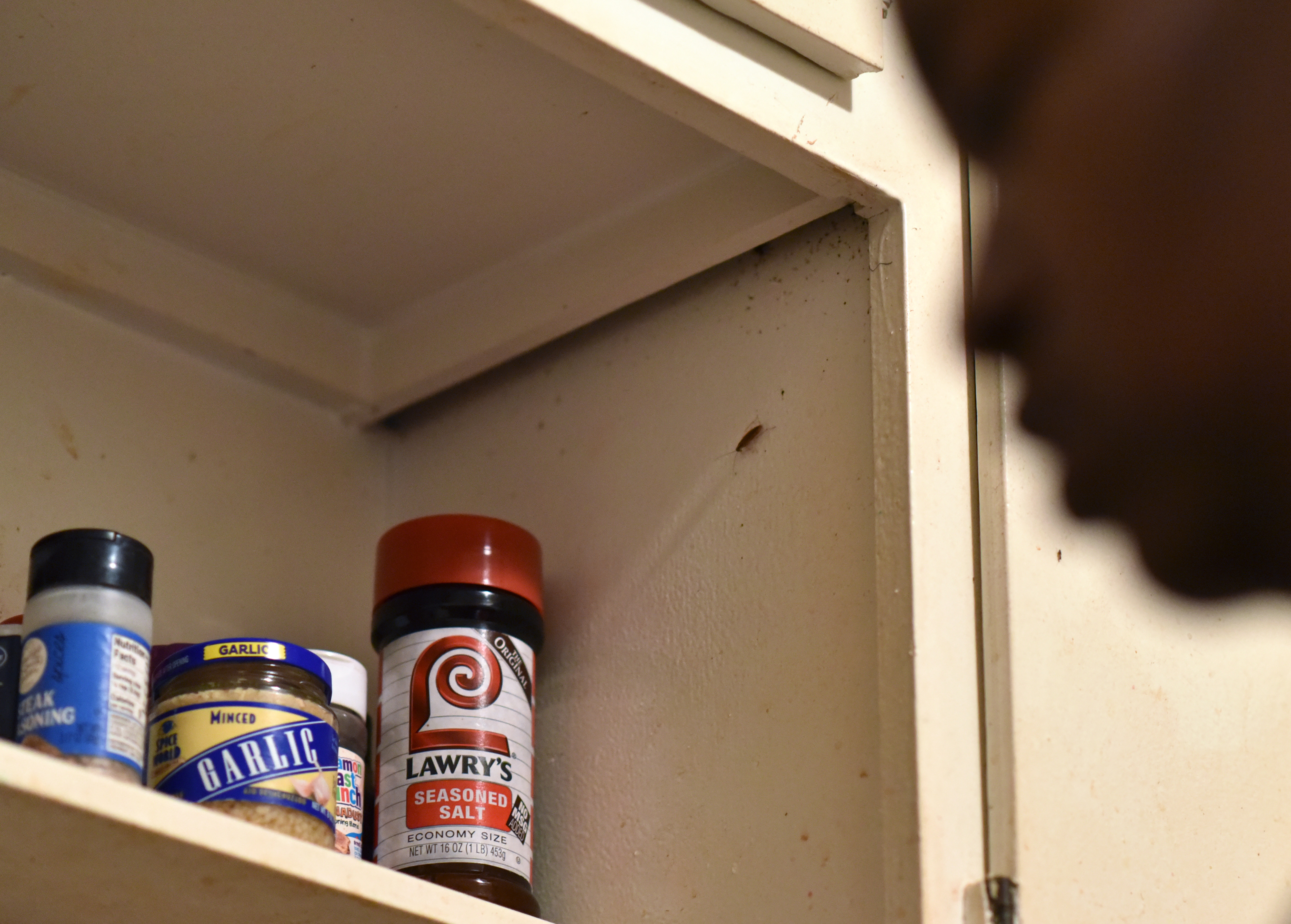
Credit: HYOSUB SHIN / AJC
Alexis Cargile says her family is trapped in an apartment that is infested with cockroaches, has mysterious electrical problems that render some light fixtures unusable, and has a perpetually clogged bathroom sink that no one has repaired despite her complaints to Atlanta code-enforcement officers. “I don’t want people thinking it’s my fault,” she says. (Hyosub Shin / [email protected])
Credit: HYOSUB SHIN / AJC
Credit: HYOSUB SHIN / AJC
Alexis Cargile escorts her 7-year-old son back to the building where Martin was shot, to the apartment where the stray bullet landed in the living room a few weeks after her baby — a girl she named Myracle — was born.
Cargile and her husband want to move but can’t afford the hundreds of dollars in application fees, security deposits and other expenses a new place would require.
So they are trapped in a complex that is dangerous and in an apartment that is infested with cockroaches, has mysterious electrical problems that render some light fixtures unusable, and has a perpetually clogged bathroom sink that no one has repaired despite Cargile’s complaints to Atlanta code-enforcement officers.
Cargile worries about her children’s safety and is embarrassed by the conditions they are growing up in.
“I don’t want people thinking it’s my fault,” she said one evening as she cooked dinner, monitored the older children’s homework and fended off cockroaches from her kitchen stove.
“But, no, it’s not my fault. It’s the apartment I live in.”
Data specialists Jennifer Peebles and Eric Fan contributed to this report.
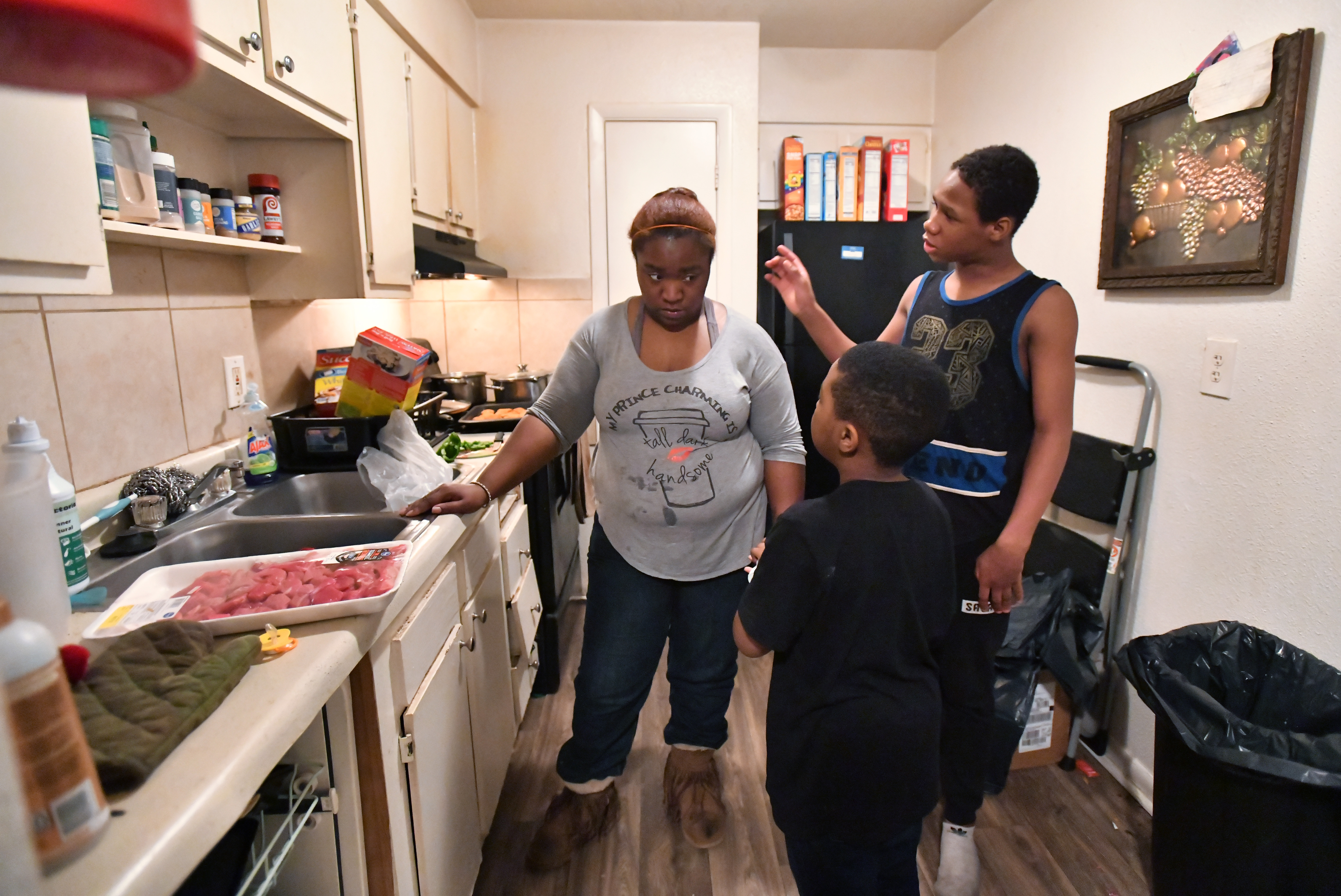
Credit: HYOSUB SHIN / AJC
Alexis Cargile talks to sons Logan, 7, and Zach, 13, as she cooks dinner at their apartment in the complex formerly known as The Life at Greenbriar. She and her husband want to move but can’t afford the hundreds of dollars in application fees, security deposits and other expenses a new place would require. (Hyosub Shin / [email protected])
Credit: HYOSUB SHIN / AJC
Credit: HYOSUB SHIN / AJC
